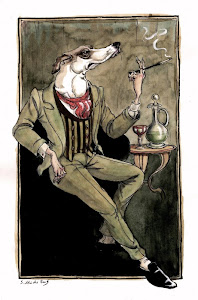 'Happy Valley was the name given to the Wanjohi Valley in the Kenya Highlands, where a small community of affluent, hedonistic white expatriates settled between the wars. While Kenya's early colonial days have been immortalised by farming pioneers like Lord Delamere and Karen Blixen, and the pioneering aviator Beryl Markham, Happy Valley became infamous under the influence of troubled socialite, Lady Idina Sackville, whose life was told in Frances Osborne's bestselling The Bolter. The era culminated with the notorious murder of the Earl of Erroll in 1941, the investigation of which laid bare the Happy Valley set's decadence and irresponsibility, chronicled in another bestseller, James Fox's White Mischief. But what is left now? In a remarkable and indefatigable archaeological quest Juliet Barnes, who has lived in Kenya all her life and whose grandparents knew some of the Happy Valley characters, has set out to explore Happy Valley to find the former homes and haunts of this extraordinary and transient set of people. With the help of a remarkable African guide and further assisted by the memories of elderly former settlers, she finds the remains of grand residences tucked away beneath the mountains and speaks to local elders who share first-hand memories of these bygone times. Nowadays these old homes, she discovers, have become tumbledown dwellings for many African families, school buildings, or their ruins have almost disappeared without trace - a revelation of the state of modern Africa that makes the gilded era of the Happy Valley set even more fantastic. A book to set alongside such singular evocations of Africa's strange colonial history as The Africa House, The Ghosts of Happy Valley is a mesmerising blend of travel narrative, social history and personal quest.'
'Happy Valley was the name given to the Wanjohi Valley in the Kenya Highlands, where a small community of affluent, hedonistic white expatriates settled between the wars. While Kenya's early colonial days have been immortalised by farming pioneers like Lord Delamere and Karen Blixen, and the pioneering aviator Beryl Markham, Happy Valley became infamous under the influence of troubled socialite, Lady Idina Sackville, whose life was told in Frances Osborne's bestselling The Bolter. The era culminated with the notorious murder of the Earl of Erroll in 1941, the investigation of which laid bare the Happy Valley set's decadence and irresponsibility, chronicled in another bestseller, James Fox's White Mischief. But what is left now? In a remarkable and indefatigable archaeological quest Juliet Barnes, who has lived in Kenya all her life and whose grandparents knew some of the Happy Valley characters, has set out to explore Happy Valley to find the former homes and haunts of this extraordinary and transient set of people. With the help of a remarkable African guide and further assisted by the memories of elderly former settlers, she finds the remains of grand residences tucked away beneath the mountains and speaks to local elders who share first-hand memories of these bygone times. Nowadays these old homes, she discovers, have become tumbledown dwellings for many African families, school buildings, or their ruins have almost disappeared without trace - a revelation of the state of modern Africa that makes the gilded era of the Happy Valley set even more fantastic. A book to set alongside such singular evocations of Africa's strange colonial history as The Africa House, The Ghosts of Happy Valley is a mesmerising blend of travel narrative, social history and personal quest.'
20 November 2014
The Ghosts of Happy Valley: Searching for the Lost World of Africa's Infamous Aristocrats
 'Happy Valley was the name given to the Wanjohi Valley in the Kenya Highlands, where a small community of affluent, hedonistic white expatriates settled between the wars. While Kenya's early colonial days have been immortalised by farming pioneers like Lord Delamere and Karen Blixen, and the pioneering aviator Beryl Markham, Happy Valley became infamous under the influence of troubled socialite, Lady Idina Sackville, whose life was told in Frances Osborne's bestselling The Bolter. The era culminated with the notorious murder of the Earl of Erroll in 1941, the investigation of which laid bare the Happy Valley set's decadence and irresponsibility, chronicled in another bestseller, James Fox's White Mischief. But what is left now? In a remarkable and indefatigable archaeological quest Juliet Barnes, who has lived in Kenya all her life and whose grandparents knew some of the Happy Valley characters, has set out to explore Happy Valley to find the former homes and haunts of this extraordinary and transient set of people. With the help of a remarkable African guide and further assisted by the memories of elderly former settlers, she finds the remains of grand residences tucked away beneath the mountains and speaks to local elders who share first-hand memories of these bygone times. Nowadays these old homes, she discovers, have become tumbledown dwellings for many African families, school buildings, or their ruins have almost disappeared without trace - a revelation of the state of modern Africa that makes the gilded era of the Happy Valley set even more fantastic. A book to set alongside such singular evocations of Africa's strange colonial history as The Africa House, The Ghosts of Happy Valley is a mesmerising blend of travel narrative, social history and personal quest.'
'Happy Valley was the name given to the Wanjohi Valley in the Kenya Highlands, where a small community of affluent, hedonistic white expatriates settled between the wars. While Kenya's early colonial days have been immortalised by farming pioneers like Lord Delamere and Karen Blixen, and the pioneering aviator Beryl Markham, Happy Valley became infamous under the influence of troubled socialite, Lady Idina Sackville, whose life was told in Frances Osborne's bestselling The Bolter. The era culminated with the notorious murder of the Earl of Erroll in 1941, the investigation of which laid bare the Happy Valley set's decadence and irresponsibility, chronicled in another bestseller, James Fox's White Mischief. But what is left now? In a remarkable and indefatigable archaeological quest Juliet Barnes, who has lived in Kenya all her life and whose grandparents knew some of the Happy Valley characters, has set out to explore Happy Valley to find the former homes and haunts of this extraordinary and transient set of people. With the help of a remarkable African guide and further assisted by the memories of elderly former settlers, she finds the remains of grand residences tucked away beneath the mountains and speaks to local elders who share first-hand memories of these bygone times. Nowadays these old homes, she discovers, have become tumbledown dwellings for many African families, school buildings, or their ruins have almost disappeared without trace - a revelation of the state of modern Africa that makes the gilded era of the Happy Valley set even more fantastic. A book to set alongside such singular evocations of Africa's strange colonial history as The Africa House, The Ghosts of Happy Valley is a mesmerising blend of travel narrative, social history and personal quest.'
Subscribe to:
Post Comments (Atom)





















2 comments:
"Nowadays these old homes, she discovers, have become tumbledown dwellings for many African families, school buildings, or their ruins have almost disappeared without trace - a revelation of the state of modern Africa..."
Just about says it all...BUT dey's been independent
Dirt poor, ravaged by disease and wars, BUT dey's bees free".
I took a history course in college called 'Imperialism' taught by Professor Norton (who looked like a retired Colonel of the Bengal Lancers) and he related that more "natives" were killed or died of disease and starvation since their countries achieved independence than they had in all the years they were colonies.
Say what you will about imperialism but the noblesse oblige of the colonizers provided a 'safety net' for the natives that hasn't existed since "dey's gots independent".
The rule of the B'wanas was a blessing not a curse for the M'gumbas and their ilk.
R ~ The development economist Peter Bauer argued much the same thing.
Post a Comment